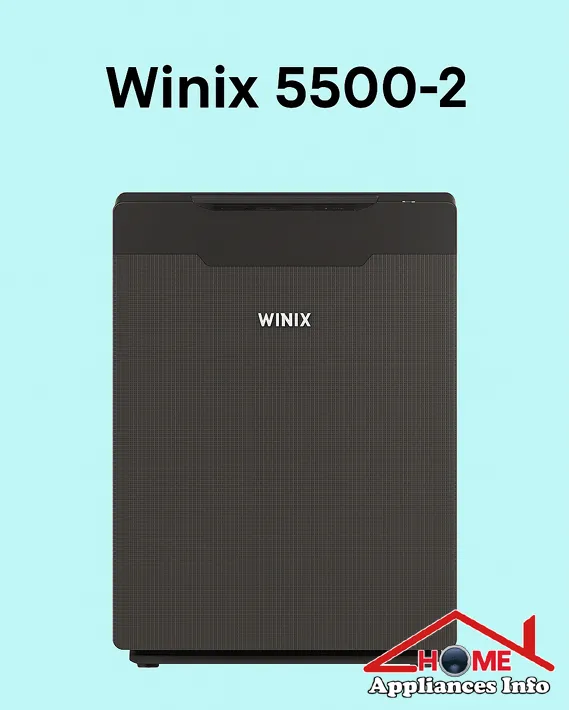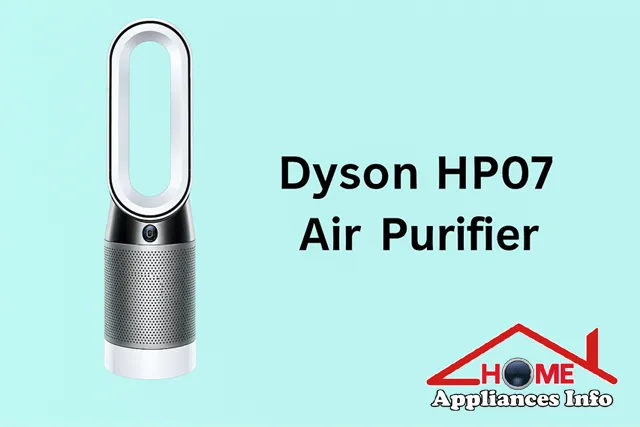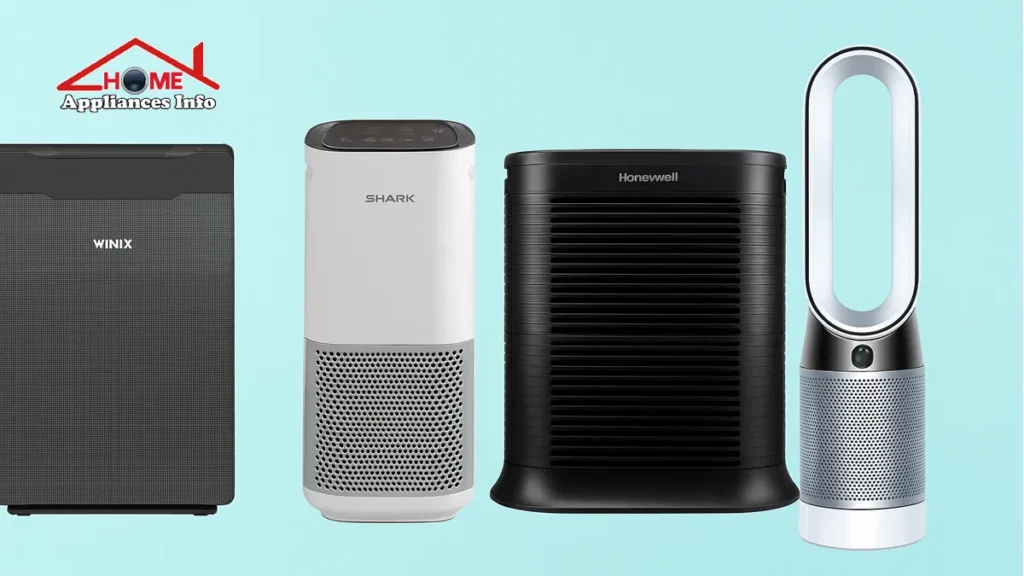If you’ve ever walked into a room and felt your nose itch, your chest feel tight, or a faint smell you just can’t get rid of, you’re not imagining it—indoor air can be surprisingly polluted. The right air purifier can make a real difference in how you breathe, sleep, and feel day to day, especially if you’re dealing with allergies, asthma, pets, or city pollution.
This guide walks you through 7 carefully selected models from Winix, Shark, Honeywell, and Dyson, plus the key health benefits, easy buying tips, and simple habits that help you get the most out of your device. The goal is to help you feel informed, not overwhelmed, so you can choose what fits your home and lifestyle with confidence.
Whether you’re creating a healthier nursery, improving your home office, or finally tackling that dusty bedroom, there is an option here that can quietly support your health in the background while you live your life in the foreground.
Why Indoor Air Quality Deserves Your Attention
We often think about what we eat or how much we move, but not what we breathe all day. Yet, most people spend the majority of their time indoors—at home, at work, or in school—where air can hold a mix of:
- Dust and dust mites
- Pollen tracked in from outside
- Pet dander and hair
- Smoke from cooking, candles, or wildfires
- Mold spores and bacteria
- Volatile organic compounds (VOCs) from paints, cleaners, and furniture
For someone with asthma or allergies, these particles can trigger symptoms quickly. But even if you feel “fine,” long-term exposure can still contribute to headaches, fatigue, irritation of the eyes and throat, or poor sleep quality.
You cannot see most of what you are breathing. That is where an air purifier becomes a quiet but powerful ally, constantly filtering out microscopic particles so your lungs do not have to.
7 Health Benefits Of Using An Air Purifier At Home
Below are seven key ways a quality unit can support your health and comfort. You do not have to notice every benefit right away, but most people feel at least one or two within the first few weeks.
1. Easier Breathing And Allergy Relief
If you wake up congested, sneeze multiple times a day, or feel like your chest is always a bit tight, allergens in your home may be playing a bigger role than you realize.
A good air purifier with a true HEPA (High Efficiency Particulate Air) filter is designed to capture a very high percentage of tiny particles like:
- Pollen
- Dust mites
- Pet dander
- Mold spores
When these are reduced in the air you breathe, your immune system does not have to “fight” as often. Over time, many people report:
- Less sneezing and runny nose
- Reduced eye itching and irritation
- Fewer allergy flare-ups in peak seasons
A practical example: running a unit in your bedroom at night can mean waking up with a clearer nose and fewer morning headaches, especially during spring and fall.
2. Better Support For Asthma And Sensitive Airways
Asthma and other respiratory conditions can make certain environments feel instantly unsafe. Triggers often include dust, smoke, strong odors, and outdoor pollution that slips indoors.
By continuously pulling air through filters, a well-chosen unit helps remove:
- Fine dust and smoke particles
- Pet hair and dander that linger in fabrics
- Some of the airborne irritants from cooking or traffic
This does not replace medication or medical advice, but it can be a helpful layer of support so your lungs do not have to work as hard every day.
3. Reduced Pet Dander, Odors, And “Dog Smell”
Pets bring a lot of joy—and a lot of fluff. If you love your animals but do not love the lingering smell of wet dog or the constant fur tumbleweeds, a unit with strong HEPA and activated carbon filters can be a real relief.
These models help with:
- Dander and hair floating in the air
- Litter box odors
- Cage or tank smells in smaller spaces
This can make your home more comfortable for both you and any guests who may be sensitive to animals.
4. A Fresher-Smelling Home Without Heavy Fragrances
Many people try to cover up odors with candles, sprays, and plugins, but those can add extra chemicals to the air and sometimes cause headaches.
An air purifier with an effective carbon filter helps reduce:
- Cooking smells (like fish, fried foods, or spices)
- Cigarette or wildfire smoke that drifts indoors
- Musty odors from damp areas
Instead of masking smells, the device works on the air itself, so your space smells naturally cleaner without relying on strong scents.
5. More Restful Sleep And Less Nighttime Congestion
Nighttime is when your body is trying to repair and reset. But if your bedroom air is dusty or full of allergens, your sleep may be lighter or more interrupted than it needs to be.
Running a quiet unit in your bedroom can help:
- Reduce snoring that is made worse by nasal congestion
- Calm down that “tickle” in the throat from dry or dusty air
- Create gentle background “white noise” that some people find calming
Even one or two extra hours of deeper, uninterrupted sleep per week can leave you feeling more focused, patient, and energetic.
6. Support During Wildfire Seasons And High-Pollution Days
If you live in an area affected by wildfires or heavy city smog, you know how quickly outdoor air can become a health concern. Indoor levels can rise sharply when you open a window or door, or even through small cracks.
A high-quality unit can help by:
- Capturing fine smoke particles that are especially harmful to lungs
- Reducing haze and smells that seep indoors
- Giving you at least one room in the home where breathing feels easier
On days when the outdoor air quality index (AQI) is poor, having a cleaner “safe zone” indoors can make a big difference in how you feel.
7. Long-Term Wellness And Peace Of Mind
Health is not just about avoiding illness; it is also about how you feel over months and years. While you might not notice every single particle your device removes, you benefit quietly, day after day.
People often report:
- Fewer headaches and less fatigue in stuffy rooms
- Improved focus, especially in home offices and study areas
- A sense of control over an aspect of their environment they used to ignore
Knowing you are actively reducing irritants and pollutants in your home can be reassuring, especially if you have young children, older adults, or anyone with lung conditions under your roof.
Air Purifier 7 Ultimate Picks For A Healthier Home
There are countless models out there. To save you time, this list focuses on seven popular, well-regarded options from Winix, Shark, Honeywell, and Dyson that balance performance, value, and everyday practicality.
These picks are not the only good ones on the market, but they are reliable starting points for most homes.
Pick 1: Winix 5500-2 – Affordable, Powerful All-Rounder

If you want strong performance without an intimidating price tag, the Winix 5500-2 is a standout Winix air purifier for medium to large rooms.
Key strengths:
- True HEPA filtration captures fine particles like pollen and dust
- Washable carbon filter helps control household and pet odors
- Auto mode with air quality sensor, so it adjusts fan speed for you
- Sleep mode for quieter operation at night
This model works well in living rooms, open-plan areas, or larger bedrooms. It is a good choice if you want one main unit to do most of the heavy lifting in your home.
Pick 2: Winix HR900 – Pet-Friendly Filtration For Fur And Dander
For homes with multiple pets, the Winix HR900 is designed with animal lovers in mind. This Winix air purifier adds extra filtration to tackle both dander and lingering smells.
What makes it pet-friendly:
- Advanced filtration layers aimed at capturing more pet hair and dander
- Enhanced carbon filters to help with strong pet odors
- Suitable for larger rooms where pets spend most of their time
If your dog or cat rules the couch and your allergies are constantly flaring, this model is worth considering as your main pet-zone device.
Pick 3: Shark HE402 (Shark Air Purifier 4) – Smart, Sleek Whole-Room Option

The Shark HE402, often sold as the Shark Air Purifier 4, brings together modern design and straightforward controls. It fits well in living rooms and open spaces where you want both performance and a clean look.
Why people like this Shark air purifier:
- Multiple fan speeds with a clear air quality display
- HEPA filtration focused on capturing small particles
- Distinct vertical design that can sit neatly against a wall
- Easy-to-use touch controls
It is a good option if you want something that blends into your decor while still working hard in the background.
Pick 4: Shark HP102 – Compact Choice For Bedrooms And Home Offices
The Shark HP102 is a smaller Shark air purifier that suits bedrooms, nurseries, and home offices where space is limited but clean air still matters.
Highlights:
- Compact footprint that fits on the floor near a bed or desk
- Designed for smaller rooms, so you are not overpaying for power you do not need
- Simple controls that are easy to set and forget
If you are working from home and feel foggy or stuffy by mid-afternoon, having a compact unit like this in your office can make hours at your desk more comfortable.
Pick 5: Honeywell HPA300 – High-Capacity Workhorse For Larger Spaces
The Honeywell HPA300 is a popular Honeywell air purifier for larger rooms. It is known for strong airflow and a simple, no-nonsense design.
What stands out:
- Designed for big spaces like open-plan living rooms or large bedrooms
- True HEPA filters for allergens such as dust, pollen, and pet dander
- Multiple cleaning levels, including a “turbo” setting for quick clean-ups
If you want a unit you can turn on and trust to move a lot of air in a short time, this is a solid fit.
Pick 6: Honeywell HPA100 – Reliable Option For Small To Medium Rooms
For smaller bedrooms, nurseries, or apartments, the Honeywell HPA100 offers many of the same strengths as its bigger sibling in a more compact form.
Why choose this Honeywell air purifier:
- Ideal for small to medium rooms, where oversized units are unnecessary
- Uses HEPA filters to target common allergens
- Straightforward controls without extra complexity
If you want something simple that does its job quietly in the background, this model fits well into everyday life.
Pick 7: Dyson Purifier Cool TP07 – Premium Design With Cooling Fan

The Dyson Purifier Cool TP07 is a higher-end Dyson air purifier that combines air cleaning with a bladeless fan. It is aimed at people who care about both air quality and aesthetics.
Key features:
- Sleek tower design that doubles as a cooling fan in warmer months
- Advanced filtration, including HEPA and carbon, in a single unit
- Smart features such as app connectivity and detailed air quality readings in some regions
If you like modern, minimalist design and want one device that both circulates and cleans air in a visible way, this is a compelling choice for living rooms or master bedrooms.
Quick Comparison: 7 Top Picks Side By Side
To help you see the differences at a glance, here is a simple comparison table. Exact specifications can vary slightly by region and model year, but this gives you a helpful overview.
| Brand & Model | Best For | Approx. Room Size (Guideline) | Key Strength | Good To Know |
|---|---|---|---|---|
| Winix 5500-2 | General home use | Medium–large rooms | Balanced performance & value | Washable carbon filter helps with odors |
| Winix HR900 | Homes with pets | Medium–large rooms | Extra filtration for pet hair & dander | Great near pet beds or main living areas |
| Shark HE402 (Air Purifier 4) | Living rooms & open spaces | Medium–large rooms | Air quality display & sleek design | Vertical shape sits neatly against a wall |
| Shark HP102 | Bedrooms, nurseries, offices | Small–medium rooms | Compact and easy to place | Good choice if floor space is limited |
| Honeywell HPA300 | Large rooms & open-plan areas | Larger spaces | Strong airflow and coverage | Ideal when you need powerful circulation |
| Honeywell HPA100 | Smaller bedrooms or apartments | Small–medium rooms | Simple, reliable allergen control | Compact footprint, easy to move |
| Dyson Purifier Cool TP07 | Design-focused homes | Medium–large rooms | Combines fan + purification | Premium price, premium aesthetics |
How To Choose The Right Air Purifier For Your Space
Choosing the right model is not about buying the most expensive option; it is about matching the device to your needs and your space. Here are the main points to consider:
1. Room Size And Coverage
Check the recommended room size listed by the manufacturer. A unit that is too small will struggle, and one that is massively oversized may be louder or more expensive than necessary.
As a rule of thumb:
- Small bedrooms or nurseries: look at compact models like the Shark HP102 or Honeywell HPA100
- Large living rooms or open spaces: consider higher-capacity options like the Winix 5500-2 or Honeywell HPA300
If in doubt, slightly “over-sizing” the device can give you stronger performance at lower, quieter settings.
2. Your Main Health Concerns
Think about what you are trying to address:
- Seasonal or year-round allergies: prioritize units with true HEPA filters
- Pet hair and dander: look for designs marketed specifically for pet homes, such as the Winix HR900
- Odors, smoke, or fumes: make sure there is a robust activated carbon filter
This helps you narrow down the list quickly so you are not distracted by features you do not really need.
3. Noise Levels And Placement
If the device will live in your bedroom or a quiet office, noise matters. Look for:
- Sleep or night modes for softer operation
- Lower fan speeds you can use at night
- Placement options (some are slim and can tuck against a wall, others need clearance on all sides)
A very powerful unit set too high can feel loud. Choosing a device with enough capacity allows you to run it at a lower, quieter speed most of the time.
4. Filter Cost And Maintenance
Buying the device is only the first step. Filters need replacing or cleaning regularly to keep working well.
Before you decide, check:
- How often filters need to be replaced (for many, it is every 6–12 months)
- The price of replacement filters
- Whether any filters are washable, like the carbon filter on the Winix 5500-2
It is better to choose a model with filters you are realistically willing to maintain than something that becomes neglected after six months.
5. Extra Features (Nice-To-Have, Not Must-Have)
Some units offer:
- Real-time air quality displays
- App control from your phone
- Scheduling or voice assistant compatibility
These can be convenient, especially in models like the Dyson Purifier Cool TP07, but they are bonuses rather than essentials. Your top priority should always be effective filtration that fits your budget.
Simple Habits That Boost Your Air Purifier’s Results
Owning a device is step one; using and caring for it well is step two. The good news is that this does not have to be complicated.
1. Run It Consistently
Instead of turning it on only when the air “seems” bad, try running it:
- Most of the day in your main living area
- All night in the bedroom if you have allergies or asthma
Many people set their device to auto mode so it can respond to changes in air quality without constant attention.
2. Place It Thoughtfully
Placement tips:
- Give it some space; avoid blocking intake or output vents with furniture or curtains
- For smoke or kitchen odors, place it closer to the source (but not right next to stovetops)
- In bedrooms, near the bed but not blowing directly in your face often works well
A little planning here goes a long way in how effectively the unit can circulate and clean the air.
3. Keep Up With Filter Changes
A clogged filter cannot do its job. Mark your calendar or set a reminder on your phone for filter changes based on the manufacturer’s guidance.
Some models have filter indicator lights, but it still helps to:
- Visually check filters every few months
- Vacuum pre-filters gently if the manual allows
- Replace filters sooner if you live in a high-pollution area or use the device heavily
You are not “failing” if you forget once in a while—just restart the habit when you remember.
4. Combine It With Other Clean-Air Habits
Your device is most effective when it is part of a bigger picture that might include:
- Regular dusting and vacuuming with a vacuum that has a good filter
- Controlling moisture to reduce mold (using exhaust fans in bathrooms, fixing leaks)
- Opening windows on low-pollution days to bring in some fresh outdoor air
Think of your device as the “lungs” of your room and your other habits as long-term support for a healthier environment.
FAQs About Choosing And Using An Air Purifier
1. Do I need a separate unit for every room?
Not always. Many people start with one unit in the room where they spend the most time—often the bedroom or main living area. If you notice a big difference and have the budget, adding a second device for another key room can be helpful, especially if you have pets or allergy sufferers at home.
2. How long does it take to notice a difference?
Some people feel a difference within days, especially with allergies or strong odors. For others, changes are more subtle and gradual—like waking up less congested over a few weeks. Running the device consistently and maintaining the filters makes results more noticeable.
3. Can it help with viruses or germs?
Filters that capture very small particles can reduce some airborne droplets that may contain germs, but no device can eliminate all risk. Think of it as one helpful layer of protection, alongside handwashing, ventilation, and following medical guidance.
4. Is it safe to run near children and pets?
Yes, as long as you follow the manufacturer’s instructions. Place the device where cords will not be tripped over, and choose models with stable bases. Many families use them in nurseries and living rooms without issues.
5. Should I still open my windows if I have a device running?
When outdoor air quality is good, opening windows briefly can help refresh indoor air. On days with high pollution, pollen counts, or wildfire smoke, it is usually better to keep windows closed and rely on your device to help keep indoor air as clean as possible.
6. How do I know which brand to trust?
Reputable brands like Winix, Shark, Honeywell, and Dyson have been in the market for years and are widely reviewed. Look for clear information about filtration type (especially HEPA), room size coverage, and filter replacement availability. Reading a mix of expert reviews and user experiences can also help you feel confident in your choice.
Conclusion: Small Device, Big Impact On Your Everyday Health
You do not have to completely remodel your home or become an indoor air expert to breathe easier. A well-chosen air purifier is a simple, practical way to support your health, reduce everyday irritants, and make your home feel fresher and more comfortable.
From budget-friendly workhorses like the Winix 5500-2 and Honeywell HPA100, to design-forward options like the Dyson Purifier Cool TP07, there is a model that can quietly fit into your life and your routines. If pets, allergies, or city air have been wearing you down, this is one area where a single decision can bring ongoing benefits for years.
As you consider your options, think about:
- Where you spend the most time (often the best place to start)
- Your main concerns—pets, pollen, smoke, or general dust
- How much maintenance you are realistically willing to do
When you are ready, choose one device that feels like a good match and give it a few weeks to work. Notice how you feel when you wake up, how your sinuses respond in peak allergy season, and whether the air simply feels lighter.
You deserve a home that supports your health rather than silently stressing it. Taking this one step—bringing the right air purifier into your space—is a calm, achievable way to move toward a cleaner, more comfortable everyday life.




2 Comments
Pingback: Dosa Machine 5 Powerful Choices: Automatic & Home Versions
Pingback: Smart Trash Can 7 Brilliant Picks: Smart Trash Bin & Smart Trash Cans That Truly Impress